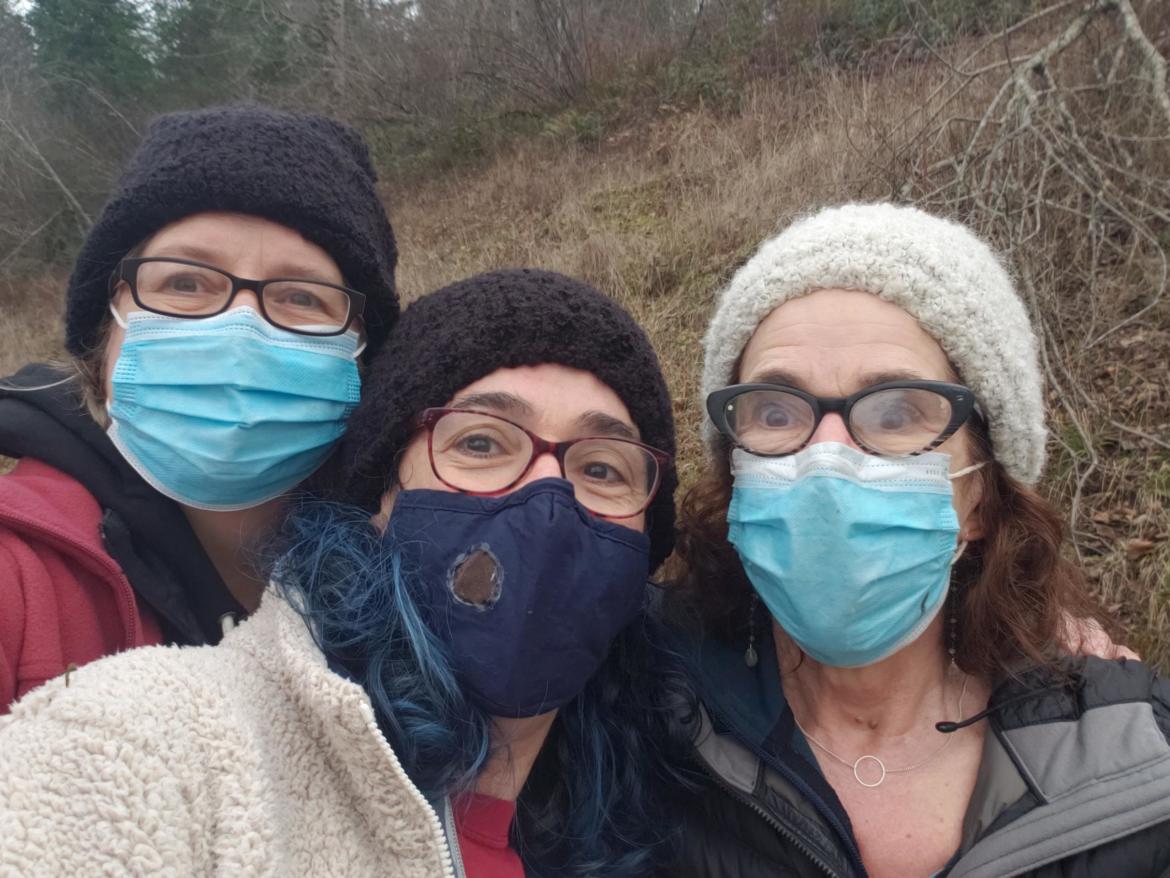I have made the claim recently that talking is my favorite activity, but I am here now to clarify that claim. It isn’t that I love talking to just anyone—although I have been known to engage with random strangers—but that my deep love of talking has to do with interacting with friends. The underlying joy is the give and take, the affirmation of mutual interest and loving. We need a verb for the activity of being a friend that that hasn’t been appropriated by Facebook.
I love the way a friendship gains heft over time, accreting layers like a snowball. Shared memes develop, shorthands for jokes, single words or gestures or lines from a song that prompt hails of laughter which stitch you more closely. I love the remember-when moments.
When I was about nine I was a Girl Scout for a single year. But during that year I learned a song that remains with me (no doubt in part because my mother often sang it too). “Make new friends, but keep the old; one is silver, the other gold.” I wouldn’t have believed a Girl Scout adage would prove to have such staying power, but it has. I don’t feel a need to assign a metallic value to friends from grade school to distinguish them from more recent friends—I consider them all gold.
I have noticed how habits develop in friendships. With certain friends, I share dinners; with others I share walks. Some I see with their partners; others I see solo. Some friends and I get together in our homes; with others a going-out routine has developed. There are a few friends with whom I engage in a variety of activities from pedicures to road trips. But all of my friendships are sustained by an ample measure of talking no matter where we are or what we’re doing.
So what becomes of a friendship when talking becomes difficult? My recent diagnosis of bulbar-onset ALS has resulted in talking becoming a physical challenge for me, as well as a comprehension challenge for my friends. So how do we conduct our friendship now? In moments of worry I imagine that the effort of understanding me will become so burdensome my friends will desert me. I don’t really believe that will happen, but the fear has prompted me to think of alternative ways friendship can be enacted, ways that don’t rely exclusively on talking.
I have recently been making use of an app on my phone called “Speech Assistant.” I type what I want to say, press a button, and a woman who I’ve grown to identify with speaks for me. It has been useful for clarifying particular words—especially those that begin with a “g” sound or a “k” sound—and also to make longer statements when I’m too tired to speak. My good friend Miriam has downloaded the app to her phone too, and we’ve had several hilarious sessions conducting multi-media conversations that flow from voice to device and back with increasing ease. She has asked her spokesperson to employ different accents depending on her mood, and she likes to save phrases with amusing profanity. These “alternative” conversations have put me in touch with an essential aspect of friendship—shared humor. I don’t remember ever having had a close friendship with someone whose humor I haven’t shared. I’ve begun to picture a day when I’ve become truly voiceless but can still eek out a laugh: We will watch our favorite comedies and stand-up comedians. We will become antic ourselves, doing anything that can unfailingly prompt a full-bellied laugh.
Another long-time friend, Ellen, recently paid me a visit from a distant state. She and I met years ago on a ski trip, and we have since routinely hiked together, chatting incessantly, analyzing the world. Realizing that talking now makes me winded, she suggested we do a silent walk. For over an hour, as we hiked through the woods, we held to our silence, comfortable in our shared history and knowledge of one another, connected even without speech.
My walk with Ellen seems akin to parallel play, the way small children first begin to enjoy friendship, situated in the same room, but playing with separate trucks or Legos or dolls. As long as my muscles allow, I am ready for parallel play again: knitting, cooking, kayaking, bike riding, gardening, etc. alongside people I love without needing to exchange more than the occasional word, or gesture, or grunt.
What about touch? In elementary school we used to watch French filmstrips, sitting on the floor in the dark. As soon as the lights dimmed my friend Wendy and I would write with our fingers on each other’s backs then whisper to guess what had been written. You might call them interactive backrubs. Maybe I could return to back-writing now? Or playing with hair, another activity I luxuriate in.
I’ve also been remembering my days in theater when in acting classes we would be partnered with someone and would gaze into each other’s eyes for minutes on end. It was an exercise that was intended to train an actor to be receptive and observant. I have to admit that I find the idea a bit creepy now, but maybe over time I can graduate to doing that too, pouring love into the eyes of my close friends, receiving their love back. We will have to be brave.
Necessity is inspiring me to be creative about alternatives, and I’m wide open to suggestions. I seek the mutual delight friendship offers, the laughter and love, the way friendship becomes an oasis providing respite from the world’s mystifying chaos. I hope my future holds intense friendships conducted with or without words.

Add Comment